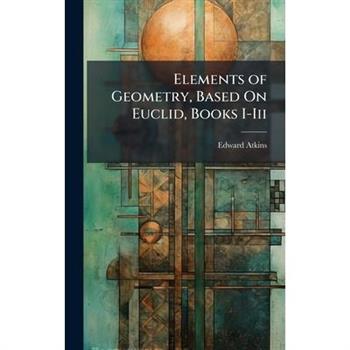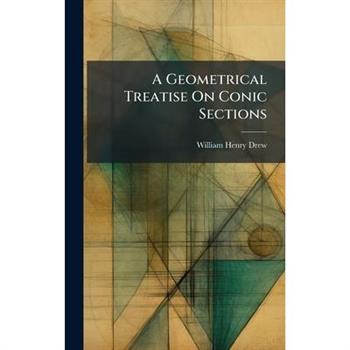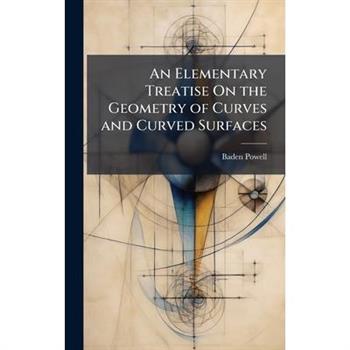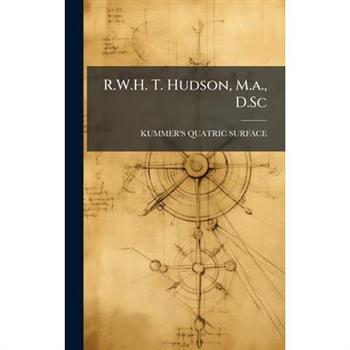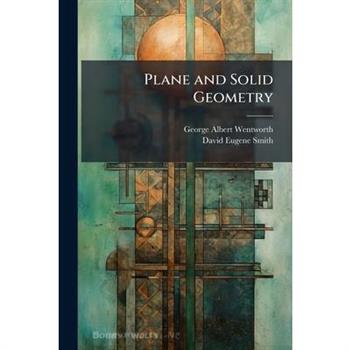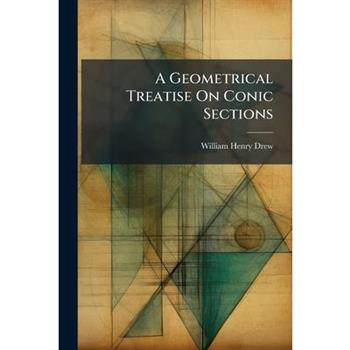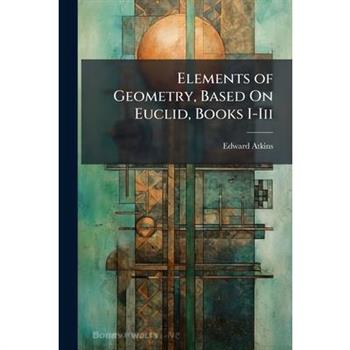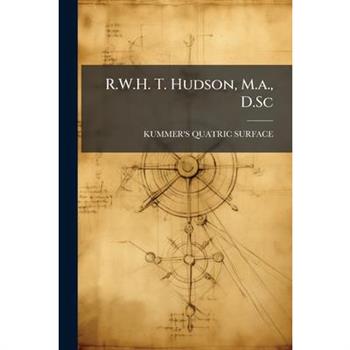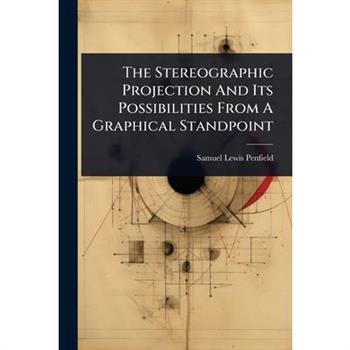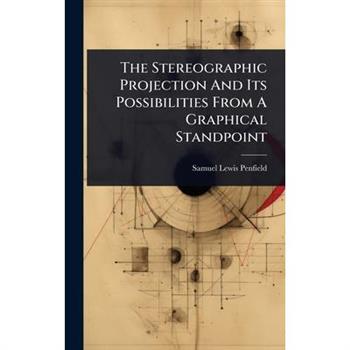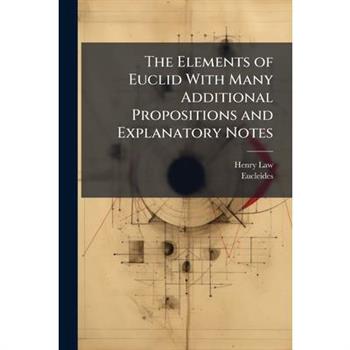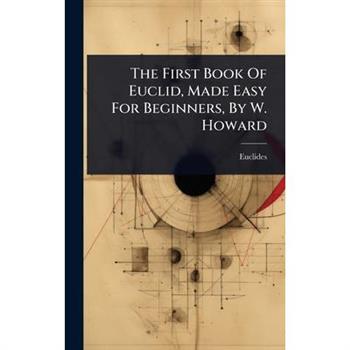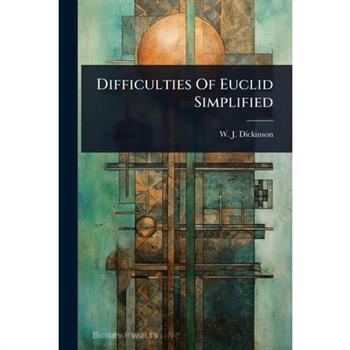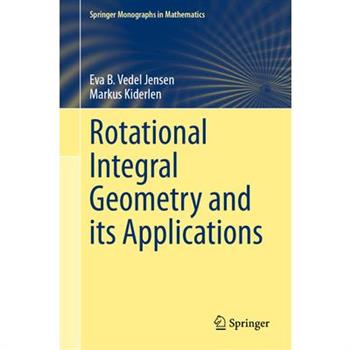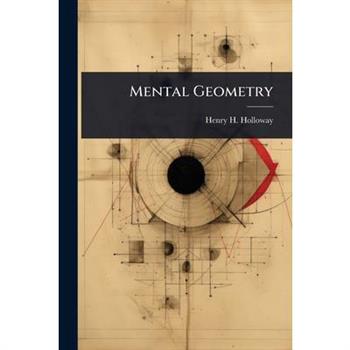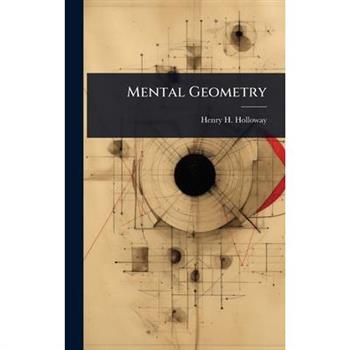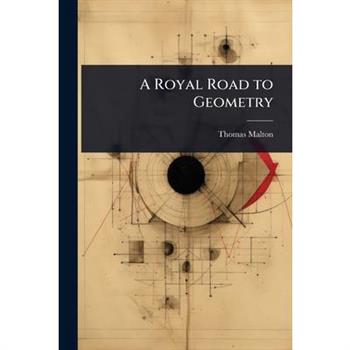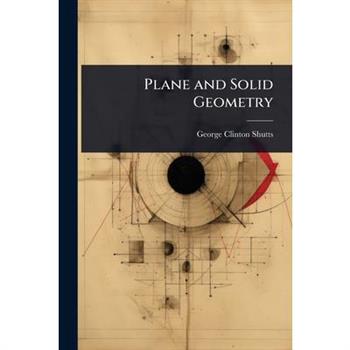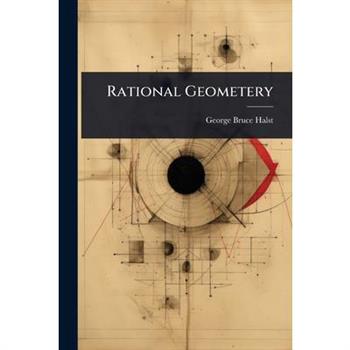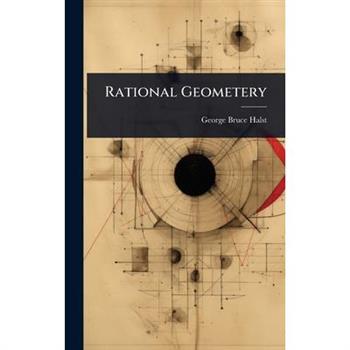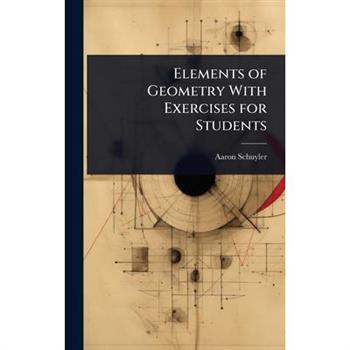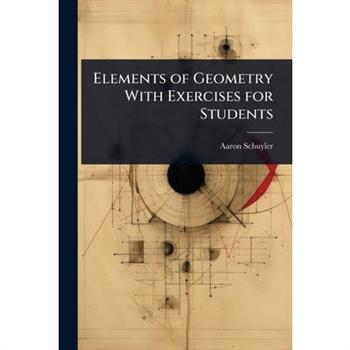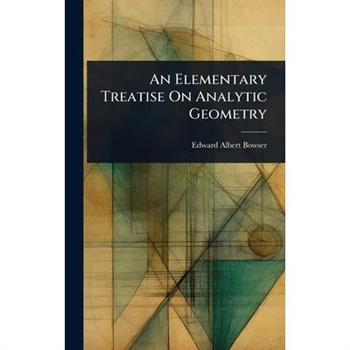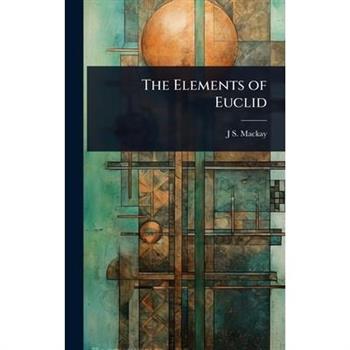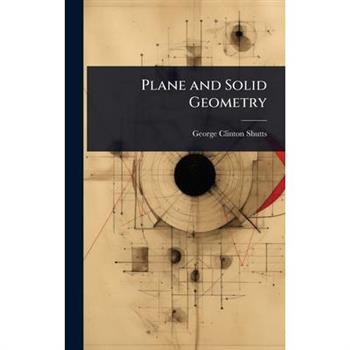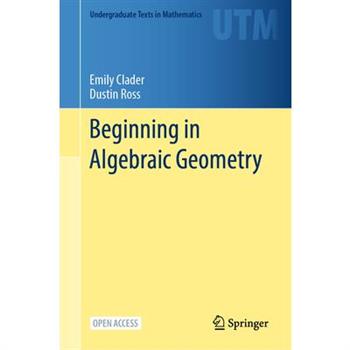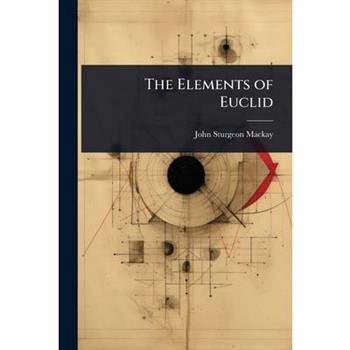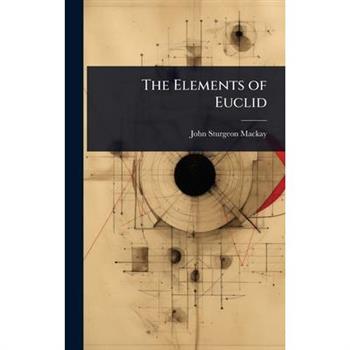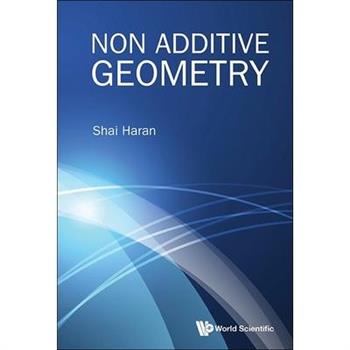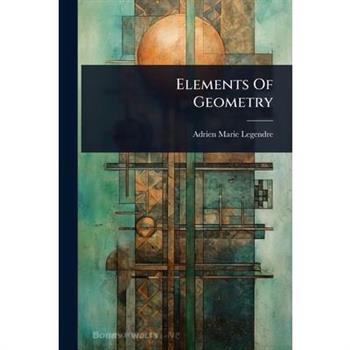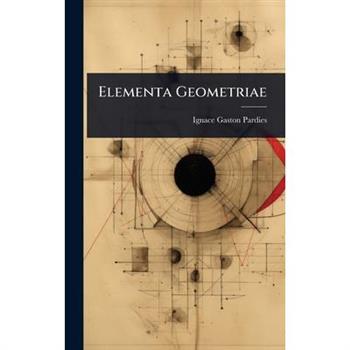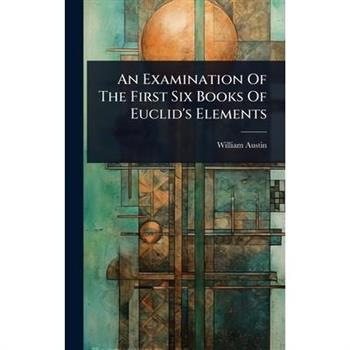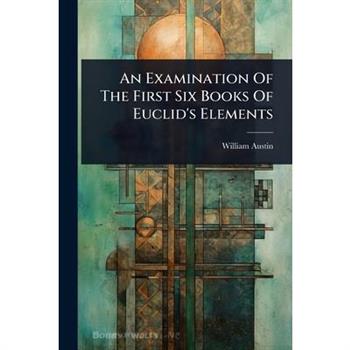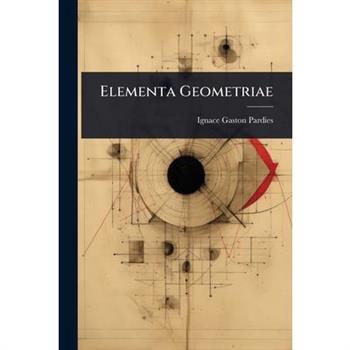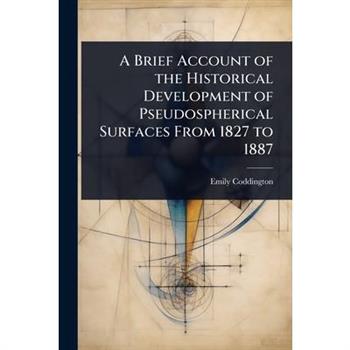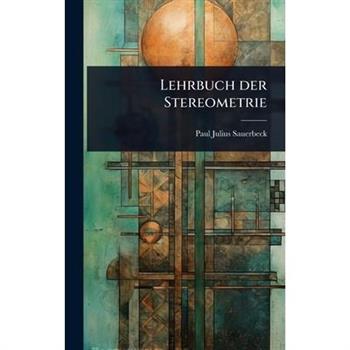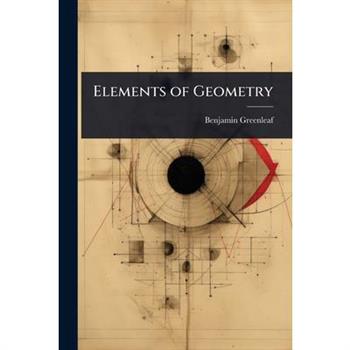Euclid's Elements of Geometry [Book 1-6, 11,12] With Explanatory Notes; Together With a Selection of Geometrical Exercises. to Which Is Prefixed an Intr., Containing a Brief Outline of the History of
This volume presents Books 1-6, 11, and 12 of Euclid's seminal work, "Elements of Geometry," accompanied by explanatory notes and a selection of geometrical exercises. Prepared with an introductory outline of the history of geometry by R. Potts, this edition aims to make Euclid's rigorous system accessible to students and enthusiasts alike. The "Elements" stands as a cornerstone of mathematical thought, influencing generations of thinkers and providing the foundation for much of modern geometry. Its logical structure and precise definitions offer not only geometrical knowledge but also a model for deductive reasoning. This edition serves as both a historical document and a practical textbook, preserving the legacy of Euclid while providing tools for contemporary learners. Whether for academic study or personal enrichment, this edition of "Euclid's Elements of Geometry" offers invaluable insights into the foundations of mathematics.This work has been selected by scholars as being culturally important, and is part of the knowledge base of civilization as we know it. This work was reproduced from the original artifact, and remains as true to the original work as possible. Therefore, you will see the original copyright references, library stamps (as most of these works have been housed in our most important libraries around the world), and other notations in the work.This work is in the public domain in the United States of America, and possibly other nations. Within the United States, you may freely copy and distribute this work, as no entity (individual or corporate) has a copyright on the body of the work.As a reproduction of a historical artifact, this work may contain missing or blurred pages, poor pictures, errant marks, etc. Scholars believe, and we concur, that this work is important enough to be preserved, reproduced, and made generally available to the public. We appreciate your support of the preservation process, and thank you for being an important part of keeping this knowledge alive and relevant.
Plane and Solid Geometry
"Plane and Solid Geometry" by George Albert Wentworth and David Eugene Smith is a comprehensive textbook originally published in 1913. Designed for high school and early college students, this book offers a rigorous treatment of Euclidean geometry, covering both plane and solid figures. The text emphasizes clear explanations, logical proofs, and numerous exercises to develop students' problem-solving skills. It includes detailed discussions of lines, angles, triangles, polygons, circles, and various solid shapes such as prisms, pyramids, cylinders, cones, and spheres. With its systematic approach and abundance of examples, "Plane and Solid Geometry" remains a valuable resource for anyone seeking a strong foundation in classical geometry.This work has been selected by scholars as being culturally important, and is part of the knowledge base of civilization as we know it. This work was reproduced from the original artifact, and remains as true to the original work as possible. Therefore, you will see the original copyright references, library stamps (as most of these works have been housed in our most important libraries around the world), and other notations in the work.This work is in the public domain in the United States of America, and possibly other nations. Within the United States, you may freely copy and distribute this work, as no entity (individual or corporate) has a copyright on the body of the work.As a reproduction of a historical artifact, this work may contain missing or blurred pages, poor pictures, errant marks, etc. Scholars believe, and we concur, that this work is important enough to be preserved, reproduced, and made generally available to the public. We appreciate your support of the preservation process, and thank you for being an important part of keeping this knowledge alive and relevant.
Euclid's Elements of Geometry [Book 1-6, 11,12] With Explanatory Notes; Together With a Selection of Geometrical Exercises. to Which Is Prefixed an Intr., Containing a Brief Outline of the History of
This volume presents Books 1-6, 11, and 12 of Euclid's seminal work, "Elements of Geometry," accompanied by explanatory notes and a selection of geometrical exercises. Prepared with an introductory outline of the history of geometry by R. Potts, this edition aims to make Euclid's rigorous system accessible to students and enthusiasts alike. The "Elements" stands as a cornerstone of mathematical thought, influencing generations of thinkers and providing the foundation for much of modern geometry. Its logical structure and precise definitions offer not only geometrical knowledge but also a model for deductive reasoning. This edition serves as both a historical document and a practical textbook, preserving the legacy of Euclid while providing tools for contemporary learners. Whether for academic study or personal enrichment, this edition of "Euclid's Elements of Geometry" offers invaluable insights into the foundations of mathematics.This work has been selected by scholars as being culturally important, and is part of the knowledge base of civilization as we know it. This work was reproduced from the original artifact, and remains as true to the original work as possible. Therefore, you will see the original copyright references, library stamps (as most of these works have been housed in our most important libraries around the world), and other notations in the work.This work is in the public domain in the United States of America, and possibly other nations. Within the United States, you may freely copy and distribute this work, as no entity (individual or corporate) has a copyright on the body of the work.As a reproduction of a historical artifact, this work may contain missing or blurred pages, poor pictures, errant marks, etc. Scholars believe, and we concur, that this work is important enough to be preserved, reproduced, and made generally available to the public. We appreciate your support of the preservation process, and thank you for being an important part of keeping this knowledge alive and relevant.
Elements of Geometry, Based On Euclid, Books I-Iii
"Elements of Geometry, Based On Euclid, Books I-III" offers a meticulous exploration of fundamental geometric principles derived from Euclid's seminal work. This edition, intended for students and educators, presents a structured approach to understanding geometric concepts, theorems, and proofs. Edward Atkins' adaptation facilitates comprehension through clear explanations and rigorous exercises. The book covers essential topics including lines, angles, triangles, circles, and their properties, emphasizing the logical progression of geometric thought. As a cornerstone of mathematical education, this text provides a solid foundation in Euclidean geometry, fostering critical thinking and problem-solving skills. This book remains a valuable resource for anyone seeking a deep understanding of classical geometry.This work has been selected by scholars as being culturally important, and is part of the knowledge base of civilization as we know it. This work was reproduced from the original artifact, and remains as true to the original work as possible. Therefore, you will see the original copyright references, library stamps (as most of these works have been housed in our most important libraries around the world), and other notations in the work.This work is in the public domain in the United States of America, and possibly other nations. Within the United States, you may freely copy and distribute this work, as no entity (individual or corporate) has a copyright on the body of the work.As a reproduction of a historical artifact, this work may contain missing or blurred pages, poor pictures, errant marks, etc. Scholars believe, and we concur, that this work is important enough to be preserved, reproduced, and made generally available to the public. We appreciate your support of the preservation process, and thank you for being an important part of keeping this knowledge alive and relevant.
A Geometrical Treatise On Conic Sections
"A Geometrical Treatise on Conic Sections" by William Henry Drew offers a rigorous exploration of conic sections through geometric methods. This treatise delves into the properties and relationships of ellipses, parabolas, and hyperbolas, providing a comprehensive understanding of these fundamental geometric figures. Designed for students and enthusiasts of mathematics, the book presents detailed proofs and constructions, enhancing the reader's grasp of classical geometry. Drew's work stands as a valuable resource for those seeking a deeper appreciation of the elegance and precision of conic sections.This work has been selected by scholars as being culturally important, and is part of the knowledge base of civilization as we know it. This work was reproduced from the original artifact, and remains as true to the original work as possible. Therefore, you will see the original copyright references, library stamps (as most of these works have been housed in our most important libraries around the world), and other notations in the work.This work is in the public domain in the United States of America, and possibly other nations. Within the United States, you may freely copy and distribute this work, as no entity (individual or corporate) has a copyright on the body of the work.As a reproduction of a historical artifact, this work may contain missing or blurred pages, poor pictures, errant marks, etc. Scholars believe, and we concur, that this work is important enough to be preserved, reproduced, and made generally available to the public. We appreciate your support of the preservation process, and thank you for being an important part of keeping this knowledge alive and relevant.
An Elementary Treatise On the Geometry of Curves and Curved Surfaces
"An Elementary Treatise On the Geometry of Curves and Curved Surfaces" by Baden Powell offers a rigorous exploration of geometric principles through the application of differential and integral calculus. Originally published in 1830, this foundational text provides a detailed investigation into the properties of curves and surfaces, making it an invaluable resource for students and scholars of mathematics.Powell's work meticulously develops the mathematical framework necessary to understand complex geometric forms. This treatise remains relevant for those studying advanced mathematical concepts and the historical development of calculus-based geometry.This work has been selected by scholars as being culturally important, and is part of the knowledge base of civilization as we know it. This work was reproduced from the original artifact, and remains as true to the original work as possible. Therefore, you will see the original copyright references, library stamps (as most of these works have been housed in our most important libraries around the world), and other notations in the work.This work is in the public domain in the United States of America, and possibly other nations. Within the United States, you may freely copy and distribute this work, as no entity (individual or corporate) has a copyright on the body of the work.As a reproduction of a historical artifact, this work may contain missing or blurred pages, poor pictures, errant marks, etc. Scholars believe, and we concur, that this work is important enough to be preserved, reproduced, and made generally available to the public. We appreciate your support of the preservation process, and thank you for being an important part of keeping this knowledge alive and relevant.
Euclid for Beginners, Books I. and Ii., With Simple Exercises by F.B. Harvey
"Euclid for Beginners, Books I. and II., With Simple Exercises" offers a comprehensive introduction to Euclidean geometry suitable for students and self-learners. This edition focuses on the foundational Books I and II of Euclid's Elements, providing clear explanations and practical exercises to enhance understanding. Readers will explore basic geometric principles, theorems, and constructions, laying a solid groundwork for further study in mathematics. F.B. Harvey's adaptation is designed to make Euclid accessible, simplifying complex concepts and offering step-by-step guidance. Whether you're a student needing extra practice or an enthusiast eager to delve into classical geometry, this book provides a valuable resource for mastering Euclid's essential principles.This work has been selected by scholars as being culturally important, and is part of the knowledge base of civilization as we know it. This work was reproduced from the original artifact, and remains as true to the original work as possible. Therefore, you will see the original copyright references, library stamps (as most of these works have been housed in our most important libraries around the world), and other notations in the work.This work is in the public domain in the United States of America, and possibly other nations. Within the United States, you may freely copy and distribute this work, as no entity (individual or corporate) has a copyright on the body of the work.As a reproduction of a historical artifact, this work may contain missing or blurred pages, poor pictures, errant marks, etc. Scholars believe, and we concur, that this work is important enough to be preserved, reproduced, and made generally available to the public. We appreciate your support of the preservation process, and thank you for being an important part of keeping this knowledge alive and relevant.
R.W.H. T. Hudson, M.a., D.Sc
Explore the mathematical contributions of R.W.H.T. Hudson, a distinguished figure in the field of geometry. This work delves into Hudson's research, focusing particularly on Kummer's Quartic Surface and related topics in algebraic geometry. Discover the intricacies of Hudson's mathematical insights and his impact on the development of geometric theory. This study offers a valuable resource for mathematicians, historians of science, and anyone interested in the evolution of mathematical thought. Gain insight into the mind of a brilliant mathematician and his lasting legacy.This work has been selected by scholars as being culturally important, and is part of the knowledge base of civilization as we know it. This work was reproduced from the original artifact, and remains as true to the original work as possible. Therefore, you will see the original copyright references, library stamps (as most of these works have been housed in our most important libraries around the world), and other notations in the work.This work is in the public domain in the United States of America, and possibly other nations. Within the United States, you may freely copy and distribute this work, as no entity (individual or corporate) has a copyright on the body of the work.As a reproduction of a historical artifact, this work may contain missing or blurred pages, poor pictures, errant marks, etc. Scholars believe, and we concur, that this work is important enough to be preserved, reproduced, and made generally available to the public. We appreciate your support of the preservation process, and thank you for being an important part of keeping this knowledge alive and relevant.
Plane and Solid Geometry
"Plane and Solid Geometry" by George Albert Wentworth and David Eugene Smith is a comprehensive textbook originally published in 1913. Designed for high school and early college students, this book offers a rigorous treatment of Euclidean geometry, covering both plane and solid figures. The text emphasizes clear explanations, logical proofs, and numerous exercises to develop students' problem-solving skills. It includes detailed discussions of lines, angles, triangles, polygons, circles, and various solid shapes such as prisms, pyramids, cylinders, cones, and spheres. With its systematic approach and abundance of examples, "Plane and Solid Geometry" remains a valuable resource for anyone seeking a strong foundation in classical geometry.This work has been selected by scholars as being culturally important, and is part of the knowledge base of civilization as we know it. This work was reproduced from the original artifact, and remains as true to the original work as possible. Therefore, you will see the original copyright references, library stamps (as most of these works have been housed in our most important libraries around the world), and other notations in the work.This work is in the public domain in the United States of America, and possibly other nations. Within the United States, you may freely copy and distribute this work, as no entity (individual or corporate) has a copyright on the body of the work.As a reproduction of a historical artifact, this work may contain missing or blurred pages, poor pictures, errant marks, etc. Scholars believe, and we concur, that this work is important enough to be preserved, reproduced, and made generally available to the public. We appreciate your support of the preservation process, and thank you for being an important part of keeping this knowledge alive and relevant.
A Geometrical Treatise On Conic Sections
"A Geometrical Treatise on Conic Sections" by William Henry Drew offers a rigorous exploration of conic sections through geometric methods. This treatise delves into the properties and relationships of ellipses, parabolas, and hyperbolas, providing a comprehensive understanding of these fundamental geometric figures. Designed for students and enthusiasts of mathematics, the book presents detailed proofs and constructions, enhancing the reader's grasp of classical geometry. Drew's work stands as a valuable resource for those seeking a deeper appreciation of the elegance and precision of conic sections.This work has been selected by scholars as being culturally important, and is part of the knowledge base of civilization as we know it. This work was reproduced from the original artifact, and remains as true to the original work as possible. Therefore, you will see the original copyright references, library stamps (as most of these works have been housed in our most important libraries around the world), and other notations in the work.This work is in the public domain in the United States of America, and possibly other nations. Within the United States, you may freely copy and distribute this work, as no entity (individual or corporate) has a copyright on the body of the work.As a reproduction of a historical artifact, this work may contain missing or blurred pages, poor pictures, errant marks, etc. Scholars believe, and we concur, that this work is important enough to be preserved, reproduced, and made generally available to the public. We appreciate your support of the preservation process, and thank you for being an important part of keeping this knowledge alive and relevant.
Elements of Geometry, Based On Euclid, Books I-Iii
"Elements of Geometry, Based On Euclid, Books I-III" offers a meticulous exploration of fundamental geometric principles derived from Euclid's seminal work. This edition, intended for students and educators, presents a structured approach to understanding geometric concepts, theorems, and proofs. Edward Atkins' adaptation facilitates comprehension through clear explanations and rigorous exercises. The book covers essential topics including lines, angles, triangles, circles, and their properties, emphasizing the logical progression of geometric thought. As a cornerstone of mathematical education, this text provides a solid foundation in Euclidean geometry, fostering critical thinking and problem-solving skills. This book remains a valuable resource for anyone seeking a deep understanding of classical geometry.This work has been selected by scholars as being culturally important, and is part of the knowledge base of civilization as we know it. This work was reproduced from the original artifact, and remains as true to the original work as possible. Therefore, you will see the original copyright references, library stamps (as most of these works have been housed in our most important libraries around the world), and other notations in the work.This work is in the public domain in the United States of America, and possibly other nations. Within the United States, you may freely copy and distribute this work, as no entity (individual or corporate) has a copyright on the body of the work.As a reproduction of a historical artifact, this work may contain missing or blurred pages, poor pictures, errant marks, etc. Scholars believe, and we concur, that this work is important enough to be preserved, reproduced, and made generally available to the public. We appreciate your support of the preservation process, and thank you for being an important part of keeping this knowledge alive and relevant.
R.W.H. T. Hudson, M.a., D.Sc
Explore the mathematical contributions of R.W.H.T. Hudson, a distinguished figure in the field of geometry. This work delves into Hudson's research, focusing particularly on Kummer's Quartic Surface and related topics in algebraic geometry. Discover the intricacies of Hudson's mathematical insights and his impact on the development of geometric theory. This study offers a valuable resource for mathematicians, historians of science, and anyone interested in the evolution of mathematical thought. Gain insight into the mind of a brilliant mathematician and his lasting legacy.This work has been selected by scholars as being culturally important, and is part of the knowledge base of civilization as we know it. This work was reproduced from the original artifact, and remains as true to the original work as possible. Therefore, you will see the original copyright references, library stamps (as most of these works have been housed in our most important libraries around the world), and other notations in the work.This work is in the public domain in the United States of America, and possibly other nations. Within the United States, you may freely copy and distribute this work, as no entity (individual or corporate) has a copyright on the body of the work.As a reproduction of a historical artifact, this work may contain missing or blurred pages, poor pictures, errant marks, etc. Scholars believe, and we concur, that this work is important enough to be preserved, reproduced, and made generally available to the public. We appreciate your support of the preservation process, and thank you for being an important part of keeping this knowledge alive and relevant.
The Stereographic Projection And Its Possibilities From A Graphical Standpoint
"The Stereographic Projection And Its Possibilities From A Graphical Standpoint" explores the principles and applications of stereographic projection, offering a detailed examination of its use in graphical representation. Written by Samuel Lewis Penfield, this work delves into the mathematical foundations and practical techniques for creating and interpreting stereographic projections. The book provides a comprehensive guide for understanding how this projection method can be applied in various fields, including cartography, mineralogy, and crystallography. Readers will find detailed explanations and illustrative examples that highlight the versatility and accuracy of stereographic projection. This book is an invaluable resource for students, researchers, and professionals seeking a deeper understanding of graphical methods and their applications in scientific and technical disciplines.This work has been selected by scholars as being culturally important, and is part of the knowledge base of civilization as we know it. This work was reproduced from the original artifact, and remains as true to the original work as possible. Therefore, you will see the original copyright references, library stamps (as most of these works have been housed in our most important libraries around the world), and other notations in the work.This work is in the public domain in the United States of America, and possibly other nations. Within the United States, you may freely copy and distribute this work, as no entity (individual or corporate) has a copyright on the body of the work.As a reproduction of a historical artifact, this work may contain missing or blurred pages, poor pictures, errant marks, etc. Scholars believe, and we concur, that this work is important enough to be preserved, reproduced, and made generally available to the public. We appreciate your support of the preservation process, and thank you for being an important part of keeping this knowledge alive and relevant.
The Stereographic Projection And Its Possibilities From A Graphical Standpoint
"The Stereographic Projection And Its Possibilities From A Graphical Standpoint" explores the principles and applications of stereographic projection, offering a detailed examination of its use in graphical representation. Written by Samuel Lewis Penfield, this work delves into the mathematical foundations and practical techniques for creating and interpreting stereographic projections. The book provides a comprehensive guide for understanding how this projection method can be applied in various fields, including cartography, mineralogy, and crystallography. Readers will find detailed explanations and illustrative examples that highlight the versatility and accuracy of stereographic projection. This book is an invaluable resource for students, researchers, and professionals seeking a deeper understanding of graphical methods and their applications in scientific and technical disciplines.This work has been selected by scholars as being culturally important, and is part of the knowledge base of civilization as we know it. This work was reproduced from the original artifact, and remains as true to the original work as possible. Therefore, you will see the original copyright references, library stamps (as most of these works have been housed in our most important libraries around the world), and other notations in the work.This work is in the public domain in the United States of America, and possibly other nations. Within the United States, you may freely copy and distribute this work, as no entity (individual or corporate) has a copyright on the body of the work.As a reproduction of a historical artifact, this work may contain missing or blurred pages, poor pictures, errant marks, etc. Scholars believe, and we concur, that this work is important enough to be preserved, reproduced, and made generally available to the public. We appreciate your support of the preservation process, and thank you for being an important part of keeping this knowledge alive and relevant.
The Elements of Euclid With Many Additional Propositions and Explanatory Notes
"The Elements of Euclid" stands as a cornerstone of mathematical thought, presenting a rigorous and systematic exposition of geometry. This edition, enriched with numerous additional propositions and explanatory notes, aims to clarify and expand upon Euclid's foundational work. Intended for students and instructors alike, this volume serves as an invaluable resource for understanding the principles of geometry and their historical development. Henry Law's enhancements provide deeper insights into the theorems and proofs presented by Euclid, making this edition particularly useful for those seeking a comprehensive understanding of Euclidean geometry. The enduring value of "The Elements" lies in its logical structure and its influence on mathematical reasoning, making it a timeless contribution to the field.This work has been selected by scholars as being culturally important, and is part of the knowledge base of civilization as we know it. This work was reproduced from the original artifact, and remains as true to the original work as possible. Therefore, you will see the original copyright references, library stamps (as most of these works have been housed in our most important libraries around the world), and other notations in the work.This work is in the public domain in the United States of America, and possibly other nations. Within the United States, you may freely copy and distribute this work, as no entity (individual or corporate) has a copyright on the body of the work.As a reproduction of a historical artifact, this work may contain missing or blurred pages, poor pictures, errant marks, etc. Scholars believe, and we concur, that this work is important enough to be preserved, reproduced, and made generally available to the public. We appreciate your support of the preservation process, and thank you for being an important part of keeping this knowledge alive and relevant.
Difficulties Of Euclid Simplified
"Difficulties Of Euclid Simplified" offers a detailed exploration of Euclidean geometry, meticulously designed to clarify the complexities often encountered by students. This edition focuses on making Euclid's foundational work more accessible, presenting each proposition with clear, step-by-step explanations and illustrative diagrams. The aim is to demystify Euclid's axioms and theorems, enabling a deeper understanding of geometric principles. Ideal for students, educators, and anyone with an interest in mathematics, this book provides a simplified yet comprehensive approach to mastering the intricacies of Euclidean geometry.This work has been selected by scholars as being culturally important, and is part of the knowledge base of civilization as we know it. This work was reproduced from the original artifact, and remains as true to the original work as possible. Therefore, you will see the original copyright references, library stamps (as most of these works have been housed in our most important libraries around the world), and other notations in the work.This work is in the public domain in the United States of America, and possibly other nations. Within the United States, you may freely copy and distribute this work, as no entity (individual or corporate) has a copyright on the body of the work.As a reproduction of a historical artifact, this work may contain missing or blurred pages, poor pictures, errant marks, etc. Scholars believe, and we concur, that this work is important enough to be preserved, reproduced, and made generally available to the public. We appreciate your support of the preservation process, and thank you for being an important part of keeping this knowledge alive and relevant.
The First Book Of Euclid, Made Easy For Beginners, By W. Howard
"The First Book Of Euclid, Made Easy For Beginners" offers a simplified introduction to Euclidean geometry, tailored for those new to the subject. This edition presents Euclid's foundational principles in an accessible manner, aiming to make complex concepts understandable for beginners. Euclid's work has been a cornerstone of mathematical education for centuries, and this book provides a valuable entry point for students and enthusiasts alike. The text covers fundamental geometric concepts and theorems, carefully explained to ensure comprehension. This edition seeks to preserve the historical significance of Euclid's work while making it more approachable for a modern audience, offering a bridge between classical mathematics and contemporary learning. It remains a relevant resource for anyone interested in exploring the logical foundations of geometry.This work has been selected by scholars as being culturally important, and is part of the knowledge base of civilization as we know it. This work was reproduced from the original artifact, and remains as true to the original work as possible. Therefore, you will see the original copyright references, library stamps (as most of these works have been housed in our most important libraries around the world), and other notations in the work.This work is in the public domain in the United States of America, and possibly other nations. Within the United States, you may freely copy and distribute this work, as no entity (individual or corporate) has a copyright on the body of the work.As a reproduction of a historical artifact, this work may contain missing or blurred pages, poor pictures, errant marks, etc. Scholars believe, and we concur, that this work is important enough to be preserved, reproduced, and made generally available to the public. We appreciate your support of the preservation process, and thank you for being an important part of keeping this knowledge alive and relevant.
Difficulties Of Euclid Simplified
"Difficulties Of Euclid Simplified" offers a detailed exploration of Euclidean geometry, meticulously designed to clarify the complexities often encountered by students. This edition focuses on making Euclid's foundational work more accessible, presenting each proposition with clear, step-by-step explanations and illustrative diagrams. The aim is to demystify Euclid's axioms and theorems, enabling a deeper understanding of geometric principles. Ideal for students, educators, and anyone with an interest in mathematics, this book provides a simplified yet comprehensive approach to mastering the intricacies of Euclidean geometry.This work has been selected by scholars as being culturally important, and is part of the knowledge base of civilization as we know it. This work was reproduced from the original artifact, and remains as true to the original work as possible. Therefore, you will see the original copyright references, library stamps (as most of these works have been housed in our most important libraries around the world), and other notations in the work.This work is in the public domain in the United States of America, and possibly other nations. Within the United States, you may freely copy and distribute this work, as no entity (individual or corporate) has a copyright on the body of the work.As a reproduction of a historical artifact, this work may contain missing or blurred pages, poor pictures, errant marks, etc. Scholars believe, and we concur, that this work is important enough to be preserved, reproduced, and made generally available to the public. We appreciate your support of the preservation process, and thank you for being an important part of keeping this knowledge alive and relevant.
The First Book Of Euclid, Made Easy For Beginners, By W. Howard
"The First Book Of Euclid, Made Easy For Beginners" offers a simplified introduction to Euclidean geometry, tailored for those new to the subject. This edition presents Euclid's foundational principles in an accessible manner, aiming to make complex concepts understandable for beginners. Euclid's work has been a cornerstone of mathematical education for centuries, and this book provides a valuable entry point for students and enthusiasts alike. The text covers fundamental geometric concepts and theorems, carefully explained to ensure comprehension. This edition seeks to preserve the historical significance of Euclid's work while making it more approachable for a modern audience, offering a bridge between classical mathematics and contemporary learning. It remains a relevant resource for anyone interested in exploring the logical foundations of geometry.This work has been selected by scholars as being culturally important, and is part of the knowledge base of civilization as we know it. This work was reproduced from the original artifact, and remains as true to the original work as possible. Therefore, you will see the original copyright references, library stamps (as most of these works have been housed in our most important libraries around the world), and other notations in the work.This work is in the public domain in the United States of America, and possibly other nations. Within the United States, you may freely copy and distribute this work, as no entity (individual or corporate) has a copyright on the body of the work.As a reproduction of a historical artifact, this work may contain missing or blurred pages, poor pictures, errant marks, etc. Scholars believe, and we concur, that this work is important enough to be preserved, reproduced, and made generally available to the public. We appreciate your support of the preservation process, and thank you for being an important part of keeping this knowledge alive and relevant.
Rotational Integral Geometry and Its Applications
This self-contained book offers an extensive state-of-the-art exposition of rotational integral geometry, a field that has reached significant maturity over the past four decades. Through a unified description of key results previously scattered across various scientific journals, this book provides a cohesive and thorough account of the subject. Initially, rotational integral geometry was driven by applications in fields such as optical microscopy. Rotational integral geometry has now evolved into an independent mathematical discipline. It contains a wealth of theorems paralleling those in classical kinematic integral geometry for Euclidean spaces, such as the rotational Crofton formulae, rotational slice formulae, and principal rotational formulae. The present book presents these for very general tensor valuations in a convex geometric setting. It also discusses various applications in the biosciences, explained with a mathematical audience in mind. This book is intended for a diverse readership, including specialists in integral geometry, and researchers and graduate students working in integral, convex, and stochastic geometry, as well as geometric measure theory.
Mental Geometry
Mental Geometry by Henry H. Holloway explores generalizations of geometrical demonstrations in planes, solids, and spherics. Designed as a manual for teachers and students, this book aims to enhance geometrical understanding through mental exercises. Holloway intends it to serve the same purpose in geometrical science as mental arithmetic does in numerical calculation. This book is a valuable resource for educators seeking to improve their teaching methods and for students aiming to deepen their grasp of geometric principles through mental visualization and problem-solving.This work has been selected by scholars as being culturally important, and is part of the knowledge base of civilization as we know it. This work was reproduced from the original artifact, and remains as true to the original work as possible. Therefore, you will see the original copyright references, library stamps (as most of these works have been housed in our most important libraries around the world), and other notations in the work.This work is in the public domain in the United States of America, and possibly other nations. Within the United States, you may freely copy and distribute this work, as no entity (individual or corporate) has a copyright on the body of the work.As a reproduction of a historical artifact, this work may contain missing or blurred pages, poor pictures, errant marks, etc. Scholars believe, and we concur, that this work is important enough to be preserved, reproduced, and made generally available to the public. We appreciate your support of the preservation process, and thank you for being an important part of keeping this knowledge alive and relevant.
Mental Geometry
Mental Geometry by Henry H. Holloway explores generalizations of geometrical demonstrations in planes, solids, and spherics. Designed as a manual for teachers and students, this book aims to enhance geometrical understanding through mental exercises. Holloway intends it to serve the same purpose in geometrical science as mental arithmetic does in numerical calculation. This book is a valuable resource for educators seeking to improve their teaching methods and for students aiming to deepen their grasp of geometric principles through mental visualization and problem-solving.This work has been selected by scholars as being culturally important, and is part of the knowledge base of civilization as we know it. This work was reproduced from the original artifact, and remains as true to the original work as possible. Therefore, you will see the original copyright references, library stamps (as most of these works have been housed in our most important libraries around the world), and other notations in the work.This work is in the public domain in the United States of America, and possibly other nations. Within the United States, you may freely copy and distribute this work, as no entity (individual or corporate) has a copyright on the body of the work.As a reproduction of a historical artifact, this work may contain missing or blurred pages, poor pictures, errant marks, etc. Scholars believe, and we concur, that this work is important enough to be preserved, reproduced, and made generally available to the public. We appreciate your support of the preservation process, and thank you for being an important part of keeping this knowledge alive and relevant.
The Elements of Euclid With Many Additional Propositions and Explanatory Notes
"The Elements of Euclid" stands as a cornerstone of mathematical thought, presenting a rigorous and systematic exposition of geometry. This edition, enriched with numerous additional propositions and explanatory notes, aims to clarify and expand upon Euclid's foundational work. Intended for students and instructors alike, this volume serves as an invaluable resource for understanding the principles of geometry and their historical development. Henry Law's enhancements provide deeper insights into the theorems and proofs presented by Euclid, making this edition particularly useful for those seeking a comprehensive understanding of Euclidean geometry. The enduring value of "The Elements" lies in its logical structure and its influence on mathematical reasoning, making it a timeless contribution to the field.This work has been selected by scholars as being culturally important, and is part of the knowledge base of civilization as we know it. This work was reproduced from the original artifact, and remains as true to the original work as possible. Therefore, you will see the original copyright references, library stamps (as most of these works have been housed in our most important libraries around the world), and other notations in the work.This work is in the public domain in the United States of America, and possibly other nations. Within the United States, you may freely copy and distribute this work, as no entity (individual or corporate) has a copyright on the body of the work.As a reproduction of a historical artifact, this work may contain missing or blurred pages, poor pictures, errant marks, etc. Scholars believe, and we concur, that this work is important enough to be preserved, reproduced, and made generally available to the public. We appreciate your support of the preservation process, and thank you for being an important part of keeping this knowledge alive and relevant.
A Royal Road to Geometry
"A Royal Road to Geometry," by Thomas Malton, first published in 1774, offers a comprehensive and accessible introduction to the fundamental principles of mathematics. This historical text presents geometry in an easy and familiar manner, making it an invaluable resource for students and enthusiasts alike. Malton璽€(TM)s approach aims to demystify complex concepts, guiding readers through Euclidean geometry with clarity and precision. Originally intended as a teaching aid, this book reflects the pedagogical methods of the 18th century. It provides insight into the historical development of mathematical education. "A Royal Road to Geometry" remains a relevant and engaging resource for anyone seeking a solid grounding in geometrical principles.This work has been selected by scholars as being culturally important, and is part of the knowledge base of civilization as we know it. This work was reproduced from the original artifact, and remains as true to the original work as possible. Therefore, you will see the original copyright references, library stamps (as most of these works have been housed in our most important libraries around the world), and other notations in the work.This work is in the public domain in the United States of America, and possibly other nations. Within the United States, you may freely copy and distribute this work, as no entity (individual or corporate) has a copyright on the body of the work.As a reproduction of a historical artifact, this work may contain missing or blurred pages, poor pictures, errant marks, etc. Scholars believe, and we concur, that this work is important enough to be preserved, reproduced, and made generally available to the public. We appreciate your support of the preservation process, and thank you for being an important part of keeping this knowledge alive and relevant.
A Royal Road to Geometry
"A Royal Road to Geometry," by Thomas Malton, first published in 1774, offers a comprehensive and accessible introduction to the fundamental principles of mathematics. This historical text presents geometry in an easy and familiar manner, making it an invaluable resource for students and enthusiasts alike. Malton璽€(TM)s approach aims to demystify complex concepts, guiding readers through Euclidean geometry with clarity and precision. Originally intended as a teaching aid, this book reflects the pedagogical methods of the 18th century. It provides insight into the historical development of mathematical education. "A Royal Road to Geometry" remains a relevant and engaging resource for anyone seeking a solid grounding in geometrical principles.This work has been selected by scholars as being culturally important, and is part of the knowledge base of civilization as we know it. This work was reproduced from the original artifact, and remains as true to the original work as possible. Therefore, you will see the original copyright references, library stamps (as most of these works have been housed in our most important libraries around the world), and other notations in the work.This work is in the public domain in the United States of America, and possibly other nations. Within the United States, you may freely copy and distribute this work, as no entity (individual or corporate) has a copyright on the body of the work.As a reproduction of a historical artifact, this work may contain missing or blurred pages, poor pictures, errant marks, etc. Scholars believe, and we concur, that this work is important enough to be preserved, reproduced, and made generally available to the public. We appreciate your support of the preservation process, and thank you for being an important part of keeping this knowledge alive and relevant.
Plane and Solid Geometry
"Plane and Solid Geometry" by George Clinton Shutts offers a comprehensive exploration of geometric principles, employing a 'suggestive method' designed to enhance understanding and retention. Published in 1904, this classic text provides a structured approach to learning both plane and solid geometry, making it an invaluable resource for students and educators alike. The book presents geometric concepts with clarity, ensuring accessibility for learners at various levels. This edition remains relevant for those seeking a solid foundation in geometry, emphasizing the timeless nature of mathematical truths and effective pedagogical techniques.This work has been selected by scholars as being culturally important, and is part of the knowledge base of civilization as we know it. This work was reproduced from the original artifact, and remains as true to the original work as possible. Therefore, you will see the original copyright references, library stamps (as most of these works have been housed in our most important libraries around the world), and other notations in the work.This work is in the public domain in the United States of America, and possibly other nations. Within the United States, you may freely copy and distribute this work, as no entity (individual or corporate) has a copyright on the body of the work.As a reproduction of a historical artifact, this work may contain missing or blurred pages, poor pictures, errant marks, etc. Scholars believe, and we concur, that this work is important enough to be preserved, reproduced, and made generally available to the public. We appreciate your support of the preservation process, and thank you for being an important part of keeping this knowledge alive and relevant.
Rational Geometery
"Rational Geometry," by George Bruce Halsted, offers a comprehensive exploration of geometric principles. This book delves into the foundations of geometry, presenting a rigorous and logical approach to understanding spatial relationships. Halsted's work is celebrated for its clarity and precision, making it an invaluable resource for students and educators alike. The text covers a wide range of topics, suitable for advanced study. It aims to provide a deep and thorough understanding of geometry, emphasizing logical reasoning and deductive proof.This work has been selected by scholars as being culturally important, and is part of the knowledge base of civilization as we know it. This work was reproduced from the original artifact, and remains as true to the original work as possible. Therefore, you will see the original copyright references, library stamps (as most of these works have been housed in our most important libraries around the world), and other notations in the work.This work is in the public domain in the United States of America, and possibly other nations. Within the United States, you may freely copy and distribute this work, as no entity (individual or corporate) has a copyright on the body of the work.As a reproduction of a historical artifact, this work may contain missing or blurred pages, poor pictures, errant marks, etc. Scholars believe, and we concur, that this work is important enough to be preserved, reproduced, and made generally available to the public. We appreciate your support of the preservation process, and thank you for being an important part of keeping this knowledge alive and relevant.
Rational Geometery
"Rational Geometry," by George Bruce Halsted, offers a comprehensive exploration of geometric principles. This book delves into the foundations of geometry, presenting a rigorous and logical approach to understanding spatial relationships. Halsted's work is celebrated for its clarity and precision, making it an invaluable resource for students and educators alike. The text covers a wide range of topics, suitable for advanced study. It aims to provide a deep and thorough understanding of geometry, emphasizing logical reasoning and deductive proof.This work has been selected by scholars as being culturally important, and is part of the knowledge base of civilization as we know it. This work was reproduced from the original artifact, and remains as true to the original work as possible. Therefore, you will see the original copyright references, library stamps (as most of these works have been housed in our most important libraries around the world), and other notations in the work.This work is in the public domain in the United States of America, and possibly other nations. Within the United States, you may freely copy and distribute this work, as no entity (individual or corporate) has a copyright on the body of the work.As a reproduction of a historical artifact, this work may contain missing or blurred pages, poor pictures, errant marks, etc. Scholars believe, and we concur, that this work is important enough to be preserved, reproduced, and made generally available to the public. We appreciate your support of the preservation process, and thank you for being an important part of keeping this knowledge alive and relevant.
Elements of Geometry With Exercises for Students
"Elements of Geometry With Exercises for Students: An Introduction to Modern Geometry" offers a comprehensive exploration of geometric principles. Designed as a textbook for students, this volume provides a structured approach to understanding the fundamental concepts of Euclidean geometry. Aaron Schuyler presents the material in a clear and accessible manner, emphasizing the practical application of geometric theorems through numerous exercises. Originally published in 1876, this book remains a valuable resource for students seeking a solid foundation in geometry. Its enduring relevance lies in its rigorous treatment of the subject and its focus on developing problem-solving skills. The exercises included are designed to reinforce understanding and promote critical thinking. "Elements of Geometry" serves both as an introduction to modern geometry and as a tool for enhancing mathematical proficiency.This work has been selected by scholars as being culturally important, and is part of the knowledge base of civilization as we know it. This work was reproduced from the original artifact, and remains as true to the original work as possible. Therefore, you will see the original copyright references, library stamps (as most of these works have been housed in our most important libraries around the world), and other notations in the work.This work is in the public domain in the United States of America, and possibly other nations. Within the United States, you may freely copy and distribute this work, as no entity (individual or corporate) has a copyright on the body of the work.As a reproduction of a historical artifact, this work may contain missing or blurred pages, poor pictures, errant marks, etc. Scholars believe, and we concur, that this work is important enough to be preserved, reproduced, and made generally available to the public. We appreciate your support of the preservation process, and thank you for being an important part of keeping this knowledge alive and relevant.
Elements of Geometry With Exercises for Students
"Elements of Geometry With Exercises for Students: An Introduction to Modern Geometry" offers a comprehensive exploration of geometric principles. Designed as a textbook for students, this volume provides a structured approach to understanding the fundamental concepts of Euclidean geometry. Aaron Schuyler presents the material in a clear and accessible manner, emphasizing the practical application of geometric theorems through numerous exercises. Originally published in 1876, this book remains a valuable resource for students seeking a solid foundation in geometry. Its enduring relevance lies in its rigorous treatment of the subject and its focus on developing problem-solving skills. The exercises included are designed to reinforce understanding and promote critical thinking. "Elements of Geometry" serves both as an introduction to modern geometry and as a tool for enhancing mathematical proficiency.This work has been selected by scholars as being culturally important, and is part of the knowledge base of civilization as we know it. This work was reproduced from the original artifact, and remains as true to the original work as possible. Therefore, you will see the original copyright references, library stamps (as most of these works have been housed in our most important libraries around the world), and other notations in the work.This work is in the public domain in the United States of America, and possibly other nations. Within the United States, you may freely copy and distribute this work, as no entity (individual or corporate) has a copyright on the body of the work.As a reproduction of a historical artifact, this work may contain missing or blurred pages, poor pictures, errant marks, etc. Scholars believe, and we concur, that this work is important enough to be preserved, reproduced, and made generally available to the public. We appreciate your support of the preservation process, and thank you for being an important part of keeping this knowledge alive and relevant.
An Elementary Treatise On Analytic Geometry
"An Elementary Treatise On Analytic Geometry" by Edward Albert Bowser offers a comprehensive exploration of analytic geometry. This treatise meticulously covers plane geometry, providing a solid foundation for students and enthusiasts alike. Additionally, it introduces the essentials of three-dimensional geometry, bridging the gap between planar and spatial concepts. Bowser's approach is designed to be accessible and thorough, making it an ideal resource for both classroom use and self-study. The book璽€(TM)s clear explanations and detailed examples ensure a strong understanding of the subject matter. This enduring work remains valuable for anyone seeking a deep dive into the principles of analytic geometry.This work has been selected by scholars as being culturally important, and is part of the knowledge base of civilization as we know it. This work was reproduced from the original artifact, and remains as true to the original work as possible. Therefore, you will see the original copyright references, library stamps (as most of these works have been housed in our most important libraries around the world), and other notations in the work.This work is in the public domain in the United States of America, and possibly other nations. Within the United States, you may freely copy and distribute this work, as no entity (individual or corporate) has a copyright on the body of the work.As a reproduction of a historical artifact, this work may contain missing or blurred pages, poor pictures, errant marks, etc. Scholars believe, and we concur, that this work is important enough to be preserved, reproduced, and made generally available to the public. We appreciate your support of the preservation process, and thank you for being an important part of keeping this knowledge alive and relevant.
An Elementary Treatise On Analytic Geometry
"An Elementary Treatise On Analytic Geometry" by Edward Albert Bowser offers a comprehensive exploration of analytic geometry. This treatise meticulously covers plane geometry, providing a solid foundation for students and enthusiasts alike. Additionally, it introduces the essentials of three-dimensional geometry, bridging the gap between planar and spatial concepts. Bowser's approach is designed to be accessible and thorough, making it an ideal resource for both classroom use and self-study. The book璽€(TM)s clear explanations and detailed examples ensure a strong understanding of the subject matter. This enduring work remains valuable for anyone seeking a deep dive into the principles of analytic geometry.This work has been selected by scholars as being culturally important, and is part of the knowledge base of civilization as we know it. This work was reproduced from the original artifact, and remains as true to the original work as possible. Therefore, you will see the original copyright references, library stamps (as most of these works have been housed in our most important libraries around the world), and other notations in the work.This work is in the public domain in the United States of America, and possibly other nations. Within the United States, you may freely copy and distribute this work, as no entity (individual or corporate) has a copyright on the body of the work.As a reproduction of a historical artifact, this work may contain missing or blurred pages, poor pictures, errant marks, etc. Scholars believe, and we concur, that this work is important enough to be preserved, reproduced, and made generally available to the public. We appreciate your support of the preservation process, and thank you for being an important part of keeping this knowledge alive and relevant.
The Elements of Euclid
"The Elements of Euclid," presented here, comprises Books I to VI of the classic mathematical treatise. This enduring work, attributed to Euclid, lays the foundation for Euclidean geometry through a systematic development of geometric principles based on a set of axioms and postulates. This edition, dating back to 1887, offers readers a glimpse into the historical study of mathematics and its pedagogical approaches. Readers will find a rigorous exposition of geometric concepts, including lines, angles, triangles, circles, and their properties. The book emphasizes logical deduction and the construction of geometric figures using only a compass and straightedge. "The Elements of Euclid" remains relevant for students, educators, and anyone interested in the foundations of mathematical thought and the elegance of geometric reasoning. This work has been selected by scholars as being culturally important, and is part of the knowledge base of civilization as we know it. This work was reproduced from the original artifact, and remains as true to the original work as possible. Therefore, you will see the original copyright references, library stamps (as most of these works have been housed in our most important libraries around the world), and other notations in the work.This work is in the public domain in the United States of America, and possibly other nations. Within the United States, you may freely copy and distribute this work, as no entity (individual or corporate) has a copyright on the body of the work.As a reproduction of a historical artifact, this work may contain missing or blurred pages, poor pictures, errant marks, etc. Scholars believe, and we concur, that this work is important enough to be preserved, reproduced, and made generally available to the public. We appreciate your support of the preservation process, and thank you for being an important part of keeping this knowledge alive and relevant.
The Elements of Euclid
"The Elements of Euclid," presented here, comprises Books I to VI of the classic mathematical treatise. This enduring work, attributed to Euclid, lays the foundation for Euclidean geometry through a systematic development of geometric principles based on a set of axioms and postulates. This edition, dating back to 1887, offers readers a glimpse into the historical study of mathematics and its pedagogical approaches. Readers will find a rigorous exposition of geometric concepts, including lines, angles, triangles, circles, and their properties. The book emphasizes logical deduction and the construction of geometric figures using only a compass and straightedge. "The Elements of Euclid" remains relevant for students, educators, and anyone interested in the foundations of mathematical thought and the elegance of geometric reasoning. This work has been selected by scholars as being culturally important, and is part of the knowledge base of civilization as we know it. This work was reproduced from the original artifact, and remains as true to the original work as possible. Therefore, you will see the original copyright references, library stamps (as most of these works have been housed in our most important libraries around the world), and other notations in the work.This work is in the public domain in the United States of America, and possibly other nations. Within the United States, you may freely copy and distribute this work, as no entity (individual or corporate) has a copyright on the body of the work.As a reproduction of a historical artifact, this work may contain missing or blurred pages, poor pictures, errant marks, etc. Scholars believe, and we concur, that this work is important enough to be preserved, reproduced, and made generally available to the public. We appreciate your support of the preservation process, and thank you for being an important part of keeping this knowledge alive and relevant.
Plane and Solid Geometry
"Plane and Solid Geometry" by George Clinton Shutts offers a comprehensive exploration of geometric principles, employing a 'suggestive method' designed to enhance understanding and retention. Published in 1904, this classic text provides a structured approach to learning both plane and solid geometry, making it an invaluable resource for students and educators alike. The book presents geometric concepts with clarity, ensuring accessibility for learners at various levels. This edition remains relevant for those seeking a solid foundation in geometry, emphasizing the timeless nature of mathematical truths and effective pedagogical techniques.This work has been selected by scholars as being culturally important, and is part of the knowledge base of civilization as we know it. This work was reproduced from the original artifact, and remains as true to the original work as possible. Therefore, you will see the original copyright references, library stamps (as most of these works have been housed in our most important libraries around the world), and other notations in the work.This work is in the public domain in the United States of America, and possibly other nations. Within the United States, you may freely copy and distribute this work, as no entity (individual or corporate) has a copyright on the body of the work.As a reproduction of a historical artifact, this work may contain missing or blurred pages, poor pictures, errant marks, etc. Scholars believe, and we concur, that this work is important enough to be preserved, reproduced, and made generally available to the public. We appreciate your support of the preservation process, and thank you for being an important part of keeping this knowledge alive and relevant.
The Elements of Euclid
"The Elements of Euclid" presents the foundational principles of geometry as expounded by the ancient Greek mathematician Euclid. This edition, focusing on Books I to VI, offers a rigorous and systematic treatment of plane geometry, covering topics such as lines, angles, triangles, parallelograms, and circles. John Sturgeon Mackay's edition aims to make Euclid's timeless work accessible to students and educators alike.Euclid's "Elements" stands as a cornerstone of mathematical thought, influencing generations of mathematicians and scientists. Its logical structure and deductive reasoning provide a model for mathematical exposition and problem-solving. This edition serves as a valuable resource for those seeking to understand the foundations of geometry and appreciate the enduring legacy of Euclidean mathematics.This work has been selected by scholars as being culturally important, and is part of the knowledge base of civilization as we know it. This work was reproduced from the original artifact, and remains as true to the original work as possible. Therefore, you will see the original copyright references, library stamps (as most of these works have been housed in our most important libraries around the world), and other notations in the work.This work is in the public domain in the United States of America, and possibly other nations. Within the United States, you may freely copy and distribute this work, as no entity (individual or corporate) has a copyright on the body of the work.As a reproduction of a historical artifact, this work may contain missing or blurred pages, poor pictures, errant marks, etc. Scholars believe, and we concur, that this work is important enough to be preserved, reproduced, and made generally available to the public. We appreciate your support of the preservation process, and thank you for being an important part of keeping this knowledge alive and relevant.
The Elements of Euclid
"The Elements of Euclid" presents the foundational principles of geometry as expounded by the ancient Greek mathematician Euclid. This edition, focusing on Books I to VI, offers a rigorous and systematic treatment of plane geometry, covering topics such as lines, angles, triangles, parallelograms, and circles. John Sturgeon Mackay's edition aims to make Euclid's timeless work accessible to students and educators alike.Euclid's "Elements" stands as a cornerstone of mathematical thought, influencing generations of mathematicians and scientists. Its logical structure and deductive reasoning provide a model for mathematical exposition and problem-solving. This edition serves as a valuable resource for those seeking to understand the foundations of geometry and appreciate the enduring legacy of Euclidean mathematics.This work has been selected by scholars as being culturally important, and is part of the knowledge base of civilization as we know it. This work was reproduced from the original artifact, and remains as true to the original work as possible. Therefore, you will see the original copyright references, library stamps (as most of these works have been housed in our most important libraries around the world), and other notations in the work.This work is in the public domain in the United States of America, and possibly other nations. Within the United States, you may freely copy and distribute this work, as no entity (individual or corporate) has a copyright on the body of the work.As a reproduction of a historical artifact, this work may contain missing or blurred pages, poor pictures, errant marks, etc. Scholars believe, and we concur, that this work is important enough to be preserved, reproduced, and made generally available to the public. We appreciate your support of the preservation process, and thank you for being an important part of keeping this knowledge alive and relevant.
Non Additive Geometry
Non Additive Geometry introduces a groundbreaking approach to arithmetic geometry, replacing traditional structure of commutative rings with Props and Bioperads - algebraic systems that can handle matrix multiplication and block direct sums. These structures allow for a deeper exploration of algebraic geometry, where addition no longer holds as a universal operation, particularly at the critical "Real prime."The book presents an innovative and comprehensive study of this new geometric framework, discussing its implications for arithmetic geometry and its potential applications in physics. Chapters explore topics such as generalized schemes, sheaves, ideals and primes, localization, and higher K-theory, following Grothendieck's pioneering methods while extending them to accommodate the needs of arithmetic. The text also addresses future applications, leaving room for readers to explore new directions and potential breakthroughs.This monograph is essential reading for advanced graduate students, researchers, and professionals in mathematics and theoretical physics interested in the foundations of arithmetic geometry, the role of Props and Bioperads, and their applications to broaden our concept of geometry, and therefore have new geometrical objects, such as the Arithmetical Surface Spec(ℤ ⊗ ℤ), the product of the primes Spec(ℤ) with themselves.
Elements Of Geometry
"Elements of Geometry," adapted from Davies Legendre, presents a rigorous and systematic exposition of Euclidean geometry. This classic work, based on the foundational principles established by Adrien-Marie Legendre, offers a comprehensive exploration of geometric axioms, theorems, and constructions. Designed for students and educators alike, this edition retains the clarity and precision of Legendre's original text while providing accessible explanations and illustrative diagrams. The book covers essential topics such as lines, angles, triangles, circles, and planes, culminating in the study of solid geometry. With its emphasis on logical reasoning and deductive proof, "Elements of Geometry" remains an invaluable resource for anyone seeking a solid understanding of fundamental geometric principles. Its enduring relevance makes it a cornerstone of mathematical education.This work has been selected by scholars as being culturally important, and is part of the knowledge base of civilization as we know it. This work was reproduced from the original artifact, and remains as true to the original work as possible. Therefore, you will see the original copyright references, library stamps (as most of these works have been housed in our most important libraries around the world), and other notations in the work.This work is in the public domain in the United States of America, and possibly other nations. Within the United States, you may freely copy and distribute this work, as no entity (individual or corporate) has a copyright on the body of the work.As a reproduction of a historical artifact, this work may contain missing or blurred pages, poor pictures, errant marks, etc. Scholars believe, and we concur, that this work is important enough to be preserved, reproduced, and made generally available to the public. We appreciate your support of the preservation process, and thank you for being an important part of keeping this knowledge alive and relevant.
Elementa Geometriae
Elementa Geometriae, by Ignace Gaston Pardies, presents a comprehensive introduction to the fundamental principles of geometry. Originally published in Latin, this accessible English translation makes Pardies's systematic approach available to a wider audience. This book meticulously covers essential geometric concepts, from basic definitions to advanced theorems. Designed as a teaching text, "Elementa Geometriae" offers clear explanations and rigorous proofs, ideal for students and educators alike. Its enduring value lies in its structured presentation of Euclidean geometry, making it a valuable resource for understanding the foundations of mathematical thought.This work has been selected by scholars as being culturally important, and is part of the knowledge base of civilization as we know it. This work was reproduced from the original artifact, and remains as true to the original work as possible. Therefore, you will see the original copyright references, library stamps (as most of these works have been housed in our most important libraries around the world), and other notations in the work.This work is in the public domain in the United States of America, and possibly other nations. Within the United States, you may freely copy and distribute this work, as no entity (individual or corporate) has a copyright on the body of the work.As a reproduction of a historical artifact, this work may contain missing or blurred pages, poor pictures, errant marks, etc. Scholars believe, and we concur, that this work is important enough to be preserved, reproduced, and made generally available to the public. We appreciate your support of the preservation process, and thank you for being an important part of keeping this knowledge alive and relevant.
An Examination Of The First Six Books Of Euclid’s Elements
"An Examination Of The First Six Books Of Euclid's Elements" by William Austin offers a detailed exploration of foundational geometric principles. Designed for students and educators alike, this book provides a thorough analysis of Euclid's original text, clarifying complex concepts and enhancing understanding of geometric reasoning. Austin's work serves as a valuable resource for anyone seeking a deeper comprehension of classical geometry and its enduring influence on mathematical thought. It presents a clear and accessible approach to Euclid's work, making it an essential addition to any mathematical library.This work has been selected by scholars as being culturally important, and is part of the knowledge base of civilization as we know it. This work was reproduced from the original artifact, and remains as true to the original work as possible. Therefore, you will see the original copyright references, library stamps (as most of these works have been housed in our most important libraries around the world), and other notations in the work.This work is in the public domain in the United States of America, and possibly other nations. Within the United States, you may freely copy and distribute this work, as no entity (individual or corporate) has a copyright on the body of the work.As a reproduction of a historical artifact, this work may contain missing or blurred pages, poor pictures, errant marks, etc. Scholars believe, and we concur, that this work is important enough to be preserved, reproduced, and made generally available to the public. We appreciate your support of the preservation process, and thank you for being an important part of keeping this knowledge alive and relevant.
An Examination Of The First Six Books Of Euclid’s Elements
"An Examination Of The First Six Books Of Euclid's Elements" by William Austin offers a detailed exploration of foundational geometric principles. Designed for students and educators alike, this book provides a thorough analysis of Euclid's original text, clarifying complex concepts and enhancing understanding of geometric reasoning. Austin's work serves as a valuable resource for anyone seeking a deeper comprehension of classical geometry and its enduring influence on mathematical thought. It presents a clear and accessible approach to Euclid's work, making it an essential addition to any mathematical library.This work has been selected by scholars as being culturally important, and is part of the knowledge base of civilization as we know it. This work was reproduced from the original artifact, and remains as true to the original work as possible. Therefore, you will see the original copyright references, library stamps (as most of these works have been housed in our most important libraries around the world), and other notations in the work.This work is in the public domain in the United States of America, and possibly other nations. Within the United States, you may freely copy and distribute this work, as no entity (individual or corporate) has a copyright on the body of the work.As a reproduction of a historical artifact, this work may contain missing or blurred pages, poor pictures, errant marks, etc. Scholars believe, and we concur, that this work is important enough to be preserved, reproduced, and made generally available to the public. We appreciate your support of the preservation process, and thank you for being an important part of keeping this knowledge alive and relevant.
Elementa Geometriae
Elementa Geometriae, by Ignace Gaston Pardies, presents a comprehensive introduction to the fundamental principles of geometry. Originally published in Latin, this accessible English translation makes Pardies's systematic approach available to a wider audience. This book meticulously covers essential geometric concepts, from basic definitions to advanced theorems. Designed as a teaching text, "Elementa Geometriae" offers clear explanations and rigorous proofs, ideal for students and educators alike. Its enduring value lies in its structured presentation of Euclidean geometry, making it a valuable resource for understanding the foundations of mathematical thought.This work has been selected by scholars as being culturally important, and is part of the knowledge base of civilization as we know it. This work was reproduced from the original artifact, and remains as true to the original work as possible. Therefore, you will see the original copyright references, library stamps (as most of these works have been housed in our most important libraries around the world), and other notations in the work.This work is in the public domain in the United States of America, and possibly other nations. Within the United States, you may freely copy and distribute this work, as no entity (individual or corporate) has a copyright on the body of the work.As a reproduction of a historical artifact, this work may contain missing or blurred pages, poor pictures, errant marks, etc. Scholars believe, and we concur, that this work is important enough to be preserved, reproduced, and made generally available to the public. We appreciate your support of the preservation process, and thank you for being an important part of keeping this knowledge alive and relevant.
A Brief Account of the Historical Development of Pseudospherical Surfaces From 1827 to 1887
璽€œA Brief Account of the Historical Development of Pseudospherical Surfaces From 1827 to 1887璽€ delves into the intricate world of nineteenth-century geometry, tracing the evolution of our understanding of pseudospherical surfaces. This detailed account explores the key properties of these surfaces, including asymptotic curves, lines of curvature, and geodesic curvature, providing a comprehensive overview of the field's development.The book examines the contributions of leading mathematicians like Enneper and Weingarten, shedding light on the concepts of focal surfaces, orthogonal trajectories, and the behavior of ray systems. It covers essential topics such as radii of curvature, the linear element, and tangent planes, offering insights into the geometry of surfaces with constant negative Gaussian curvature.This historical study provides a valuable resource for mathematicians and historians of science, illuminating the foundational work that shaped modern geometry and offering a glimpse into the mathematical landscape of the late 19th century. Its enduring appeal lies in its meticulous treatment of a fascinating and historically significant area of mathematical research.This work has been selected by scholars as being culturally important, and is part of the knowledge base of civilization as we know it. This work was reproduced from the original artifact, and remains as true to the original work as possible. Therefore, you will see the original copyright references, library stamps (as most of these works have been housed in our most important libraries around the world), and other notations in the work.This work is in the public domain in the United States of America, and possibly other nations. Within the United States, you may freely copy and distribute this work, as no entity (individual or corporate) has a copyright on the body of the work.As a reproduction of a historical artifact, this work may contain missing or blurred pages, poor pictures, errant marks, etc. Scholars believe, and we concur, that this work is important enough to be preserved, reproduced, and made generally available to the public. We appreciate your support of the preservation process, and thank you for being an important part of keeping this knowledge alive and relevant.
Lehrbuch der Stereometrie
"Lehrbuch der Stereometrie," with the subtitle "Nebst Zahlreichen Uebungen und Einem Abschnitt ?1/4ber Krystallographie," by Paul Julius Sauerbeck, is a comprehensive textbook on solid geometry, also known as stereometry. Originally published around 1900, this book presents a detailed exploration of three-dimensional geometric figures and their properties. It is designed as an instructional guide, incorporating numerous exercises to reinforce learning and understanding. A notable section is dedicated to crystallography, linking geometric principles to the study of crystal structures. This book serves as a valuable resource for students and educators interested in the historical development of mathematical education and the intersection of geometry and crystallography.This work has been selected by scholars as being culturally important, and is part of the knowledge base of civilization as we know it. This work was reproduced from the original artifact, and remains as true to the original work as possible. Therefore, you will see the original copyright references, library stamps (as most of these works have been housed in our most important libraries around the world), and other notations in the work.This work is in the public domain in the United States of America, and possibly other nations. Within the United States, you may freely copy and distribute this work, as no entity (individual or corporate) has a copyright on the body of the work.As a reproduction of a historical artifact, this work may contain missing or blurred pages, poor pictures, errant marks, etc. Scholars believe, and we concur, that this work is important enough to be preserved, reproduced, and made generally available to the public. We appreciate your support of the preservation process, and thank you for being an important part of keeping this knowledge alive and relevant.
Lehrbuch der Stereometrie
"Lehrbuch der Stereometrie," with the subtitle "Nebst Zahlreichen Uebungen und Einem Abschnitt ?1/4ber Krystallographie," by Paul Julius Sauerbeck, is a comprehensive textbook on solid geometry, also known as stereometry. Originally published around 1900, this book presents a detailed exploration of three-dimensional geometric figures and their properties. It is designed as an instructional guide, incorporating numerous exercises to reinforce learning and understanding. A notable section is dedicated to crystallography, linking geometric principles to the study of crystal structures. This book serves as a valuable resource for students and educators interested in the historical development of mathematical education and the intersection of geometry and crystallography.This work has been selected by scholars as being culturally important, and is part of the knowledge base of civilization as we know it. This work was reproduced from the original artifact, and remains as true to the original work as possible. Therefore, you will see the original copyright references, library stamps (as most of these works have been housed in our most important libraries around the world), and other notations in the work.This work is in the public domain in the United States of America, and possibly other nations. Within the United States, you may freely copy and distribute this work, as no entity (individual or corporate) has a copyright on the body of the work.As a reproduction of a historical artifact, this work may contain missing or blurred pages, poor pictures, errant marks, etc. Scholars believe, and we concur, that this work is important enough to be preserved, reproduced, and made generally available to the public. We appreciate your support of the preservation process, and thank you for being an important part of keeping this knowledge alive and relevant.
Elements of Geometry
"Elements of Geometry," by Benjamin Greenleaf, is a comprehensive textbook designed to elucidate the principles of geometry with a strong emphasis on practical application. Originally published in 1874, this edition offers a rigorous exploration of geometric concepts alongside their use in mensuration璽€"the process of measuring lengths, areas, and volumes. This book aims to bridge the gap between theoretical knowledge and real-world problem-solving. Greenleaf's approach makes this text valuable for students and educators seeking a deeper understanding of geometry's relevance. The book's enduring appeal lies in its clear explanations and its focus on making geometry accessible and applicable to everyday calculations and measurements. A classic resource for anyone interested in mastering the fundamentals of geometry.This work has been selected by scholars as being culturally important, and is part of the knowledge base of civilization as we know it. This work was reproduced from the original artifact, and remains as true to the original work as possible. Therefore, you will see the original copyright references, library stamps (as most of these works have been housed in our most important libraries around the world), and other notations in the work.This work is in the public domain in the United States of America, and possibly other nations. Within the United States, you may freely copy and distribute this work, as no entity (individual or corporate) has a copyright on the body of the work.As a reproduction of a historical artifact, this work may contain missing or blurred pages, poor pictures, errant marks, etc. Scholars believe, and we concur, that this work is important enough to be preserved, reproduced, and made generally available to the public. We appreciate your support of the preservation process, and thank you for being an important part of keeping this knowledge alive and relevant.




![Euclid's Elements of Geometry [Book 1-6, 11,12] With Explanatory Notes; Together With a Selection of Geometrical Exercises. to Which Is Prefixed an Intr., Containing a Brief Outline of the History of Euclid's Elements of Geometry [Book 1-6, 11,12] With Explanatory Notes; Together With a Selection of Geometrical Exercises. to Which Is Prefixed an Intr., Containing a Brief Outline of the History of](https://cdn.kingstone.com.tw/english/images/product/8063/9781023818063m.jpg?Q=74d54)


![Euclid's Elements of Geometry [Book 1-6, 11,12] With Explanatory Notes; Together With a Selection of Geometrical Exercises. to Which Is Prefixed an Intr., Containing a Brief Outline of the History of Euclid's Elements of Geometry [Book 1-6, 11,12] With Explanatory Notes; Together With a Selection of Geometrical Exercises. to Which Is Prefixed an Intr., Containing a Brief Outline of the History of](https://cdn.kingstone.com.tw/english/images/product/3487/9781023823487m.jpg?Q=05330)
